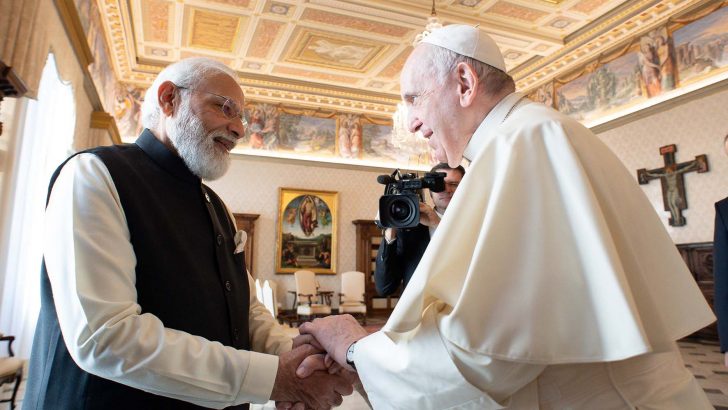The story is told – probably apocryphally – that in the year 1210 St Francis of Assisi had an audience with Pope Innocent III. During the course of their meeting, both men strolled through the Vatican treasury with all the wealth that this contained at the time as a sure sign of the temporal power of the Pope.
It is said that Pope Innocent recalled to St Francis the moment in the Acts of the Apostles where St Peter had nothing to give to the beggar. The Pope boasted: “My dear Francis, we can no longer say with Peter ‘silver and gold have I none’.”
Francis is reported to have replied, ‘true Holy Father, and neither can you say ‘rise and walk’.”
The teller of the tale was undoubtedly trying to get across the idea that as earthly wealth is accumulated and becomes intoxicating, the Church’s power to act in the name of Christ diminishes.
In the 21st Century, the papacy remains a potent force in the world and Pope Francis is undoubtedly one of the most recognisable moral leaders in the world. His thoughts on climate change, for example, led bulletins across the BBC network for almost 24 hours last week. The following day, the motorcade of the US president Joe Biden – leader of the free world – rolled into Vatican City for an audience with the Pope. Just a day later, the leader of India – the world’s biggest democracy – prime minister Narendra Modi sat in the same seat as Mr Biden before the Pontiff.
Headlines
Mr Biden made immediate headlines by insisting to journalists that the Pope had lauded him for being a good Catholic, despite his support for abortion, and told the president (only America’s second Catholic head of state) that he should continue to receive Holy Communion despite the misgivings of some US bishops.
We don’t know what went on during the meeting, and the Vatican is unlikely to contradict the president even if his recollection of the meeting is slightly different from that of the Pope’s.
Francis has long argued against what he describes as the ‘weaponisation’ of the Eucharist. Dialogue, he says, rather than confrontation is the way to approach Catholic politicians who stand diametrically opposed to Church teaching while insisting on their Catholic credentials and presenting themselves for Communion. Mr Biden insisted that the Pontiff did not raise with him the issue of abortion and the incompatibility of a Catholic supporting it. Again, we only have the president’s account of the meeting but it seems to be that if the Francis way is dialogue rather than confrontation, surely the meeting could have been the beginning of a dialogue to help Mr Biden see the wrongheadedness of his position?
In relation to the meeting with Mr Modi, a brief communique from the Vatican stated that “during a brief conversation, the cordial relations between the Holy See and India were discussed”. No mention was made whether or not Pope Francis had raised with the Indian leader a rise in anti-Christian violence in the country, despite the fact that the bishops’ conference there has been extremely anxious about the issue and the wider concern about anti-Christian discrimination.
Perhaps, the issue did come up and the Vatican felt it more judicious not to mention this in the communique. Diplomacy often involves discreet conversations that are not reported to the media, but I am sure that Indian Catholics would appreciate the Pope raising the issue.
Listening
The Vatican remains one of the greatest ‘listening posts’ in the world where leaders go both to meet the Pope and to benefit from the Holy See’s unrivalled network in every corner of the globe. When it comes to geopolitics, the Pope exercises what can best be described as ‘soft power’. The Church has no selfish strategic interest in world affairs, so the Pope can often offer a more nuanced approach to world affairs than countries that are trying to outdo one another in trade talks.
That voice must continue to be a prophetic one: whether it is calling on a leader like Mr Biden to be more authentic in his Catholicism, or standing up for persecuted Christians throughout the world, the Pope must be to the fore of having those difficult conversations. Otherwise, on the temporal stage the power of the papacy is little more than a carryover from a time when the Pope was a monarch and the visits of world leaders really just photo opportunities.


 Michael Kelly
Michael Kelly Pope Francis shakes hands with Indian Prime Minister Narendra Modi during a meeting
at the Vatican on Saturday. Photo: Vatican Media.
Pope Francis shakes hands with Indian Prime Minister Narendra Modi during a meeting
at the Vatican on Saturday. Photo: Vatican Media.